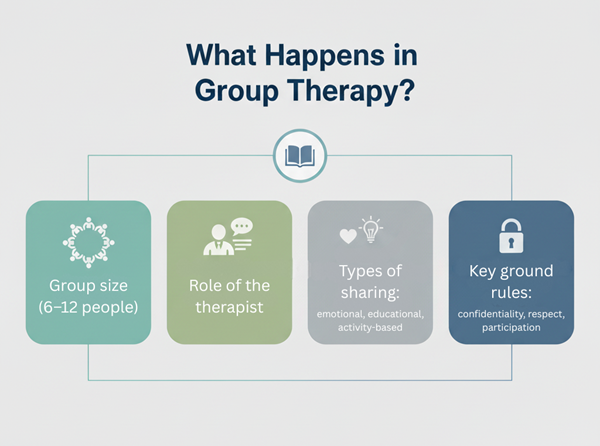How Group Therapy Can Make a Difference in Your Mental Well-Being
When you’re navigating challenges related to mental health, it’s easy to feel like you’re going through it alone. Group Therapy for mental wellness offers a unique space where you can connect with others who share similar struggles, learn from different perspectives, and feel supported in a safe, non-judgmental environment.
What Is Group Therapy for Mental Wellness?
Group therapy brings together a small group of people, typically 6 to 12, under the guidance of a trained therapist. Sessions focus on sharing experiences, learning coping skills, and supporting one another through open dialogue or structured activities. This process fosters healing through community, empathy, and connection.
Each session may look different depending on the group’s goals. Some groups are open and conversational, while others follow a curriculum with activities like role-playing, journaling, or skill-building exercises. The consistent element is the therapist’s role in creating safety, guiding the discussion, and fostering healthy group dynamics.
Group therapy is not a replacement for individual therapy, but for many people, it offers something individual sessions can’t: the power of shared experience.
Who Can Benefit?
Group therapy is helpful for a wide range of concerns:
Grief and loss – Sharing space with others who understand the pain of losing a loved one can be deeply validating and comforting. It provides permission to grieve openly and feel seen.
Social anxiety – Practicing communication skills in a supportive group can reduce anxiety and build confidence. With time, members learn to speak up, make eye contact, and assert themselves without fear of judgment.
Postpartum depression – New parents often feel isolated; connecting with others experiencing similar challenges helps reduce shame and loneliness. These groups may focus on emotional validation as well as parenting strategies.
Identity-focused groups – Many find healing in spaces tailored to cultural or identity needs. For example:
Men’s support groups, where participants can explore emotional health free of stigma.
South Asian queer support groups, which provide affirmation and understanding in navigating cultural and identity struggles.
Asian American support groups, offering shared cultural understanding while addressing unique challenges around belonging and identity.
These specialized groups foster belonging, validation, and safety that can be harder to find in general therapy spaces.
Why It Works
The success of group therapy lies not just in the techniques used, but in the human connections it fosters.
Shared understanding – Hearing others’ stories reminds you that you are not alone. That simple realization can be profoundly healing.
Learning from peers – Group members often share strategies or perspectives that might never emerge in one-on-one sessions. You benefit from both therapist guidance and peer wisdom.
Building social skills – Practicing communication in a safe space reduces isolation. Members learn to give and receive feedback, express needs, and be vulnerable.
Accountability and encouragement – The group setting motivates members to stay engaged in their growth. Knowing others are rooting for you creates momentum.
Reducing stigma – Open conversations normalize mental health struggles and make seeking help less intimidating. When you see others being honest, it becomes easier to speak your truth.
Final Thoughts
Group Therapy for mental wellness is more than just a therapy format, it’s a community of support. Whether you’re coping with grief, social anxiety, postpartum depression, or seeking identity-focused healing spaces, group therapy provides connection, empathy, and practical tools for growth. It reminds us that while our struggles may be personal, healing often happens in community.



